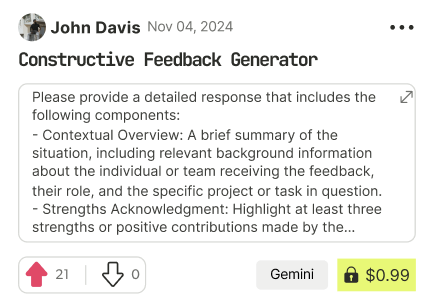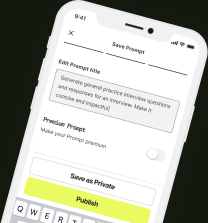prompt mine App
Find, Create & Share AI Magic
10 Effective Study Techniques to Master Complex Subjects Quickly for Students and Professionals
Okay, here are 10 effective study techniques designed to help individuals master complex subjects swiftly, applicable across various disciplines and suitable for both academic and professional environments:
1. **Spaced Repetition:** This involves reviewing material at increasing intervals. Instead of cramming the night before, revisit the concepts a day later, then 3 days later, then a week later, then a month later, and so on. This leverages the "forgetting curve" to solidify long-term memory.
* **How to implement:** Use flashcards (physical or digital like Anki), create a review schedule in your calendar, or use software specifically designed for spaced repetition.
* **Why it works:** It forces your brain to actively recall the information, strengthening neural pathways and improving long-term retention.
2. **Active Recall:** Instead of passively rereading notes or textbooks, actively try to retrieve information from memory. Test yourself frequently without looking at the answers immediately.
* **How to implement:** Use practice questions, create your own quizzes, try explaining the concepts out loud, or summarize the material from memory.
* **Why it works:** It strengthens the connections in your brain related to the material, making it easier to retrieve later.
3. **Teach Someone Else (The Feynman Technique):** Explain the concept in simple terms to someone who doesn’t understand it. Identify gaps in your understanding and refine your explanation until it’s clear and concise.
* **How to implement:** Choose a friend, family member, or even an imaginary audience and explain the concept as if they're completely unfamiliar with it.
* **Why it works:** It forces you to break down complex ideas into simpler components, revealing your own understanding and identifying areas where you need further clarification.
4. **Interleaving:** Instead of studying one topic in depth before moving on to the next, mix up the order in which you study different topics.
* **How to implement:** Create a study schedule that alternates between different subjects or concepts, even if they seem unrelated at first.
* **Why it works:** It helps you develop a deeper understanding of the material by forcing you to distinguish between related concepts and apply them in different contexts.
5. **Elaboration:** Connect new information to what you already know. Ask yourself "why" and "how" questions to explore the connections between different concepts.
* **How to implement:** Relate new information to your personal experiences, create analogies, or draw diagrams that show the relationships between different concepts.
* **Why it works:** It creates richer and more meaningful connections in your brain, making the information easier to remember and understand.
6. **Mind Mapping:** Visually organize information by creating a diagram with a central topic and branching out with related concepts, subtopics, and keywords.
* **How to implement:** Start with a central idea in the middle of a page and branch out with related ideas. Use different colors, images, and keywords to create a visual representation of the information.
* **Why it works:** It helps you see the bigger picture, identify relationships between different concepts, and organize information in a way that is easy to understand and remember.
7. **Pomodoro Technique:** Break your study time into focused intervals (typically 25 minutes) followed by short breaks (5 minutes). After four "pomodoros," take a longer break (15-30 minutes).
* **How to implement:** Set a timer for 25 minutes and focus solely on your study material. Take a 5-minute break afterwards. Repeat four times, then take a longer break.
* **Why it works:** It helps you stay focused and avoid burnout by breaking up long study sessions into manageable chunks.
8. **Self-Explanation:** While studying, pause periodically and explain the material to yourself, as if you were teaching it to someone else.
* **How to implement:** Stop after reading a paragraph or section and explain what you just read in your own words. Ask yourself questions and try to answer them without looking at the text.
* **Why it works:** It forces you to actively process the information and identify any gaps in your understanding.
9. **Varied Study Environments:** Don't always study in the same location. Changing your study environment can improve recall.
* **How to implement:** Try studying in a library, a coffee shop, your bedroom, or even outdoors. Experiment with different environments to see what works best for you.
* **Why it works:** Contextual cues can trigger memories, and varying your environment can strengthen these cues, making it easier to recall the information later.
10. **Identify and Address Knowledge Gaps Immediately:** As you study, actively seek out areas where your understanding is weak. Don't gloss over difficult concepts – tackle them head-on.
* **How to implement:** Use practice questions, quizzes, or self-explanation to identify knowledge gaps. Then, focus your study efforts on those specific areas until you understand them thoroughly.
* **Why it works:** It prevents you from building a shaky foundation, which can lead to difficulties later on. Addressing knowledge gaps early ensures a more solid understanding of the material.
These techniques, when implemented consistently and adapted to individual learning styles and preferences, can significantly enhance learning speed and retention, enabling mastery of complex subjects in both academic and professional settings. Remember to experiment and find the combination that works best for you!

Find Powerful AI Prompts
Discover, create, and customize prompts with different models, from ChatGPT to Gemini in seconds

Simple Yet Powerful
Start with an idea and use expert prompts to bring your vision to life!

